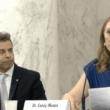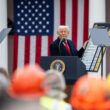A strong movement in Britain
By Bulletin Staff, June 25, 2007
Lawrence Wittner is right to speak of a fierce anti-nuclear uprising in Britain over the past
year. Campaign for Nuclear Disarmament (CND), together with other peace organizations, has built
Britain’s broadest alliance against nuclear weapons ever. We built this alliance in opposition to
our government’s plans to pursue a replacement for Britain’s Trident nuclear weapons system.
When Parliament debated and voted on the issue in March, the government suffered its largest
backbench rebellion on a domestic issue since the Labour Party came to power in 1997. Indeed, the
scale of opposition was historic–the largest backbench rebellion on a defense policy since 1924.
While the government resolution was passed, the foreign secretary felt compelled to assure MPs that
the decision was “not irreversible,”; and the issue will come back to Parliament for further votes
as the process unfolds. And for the first time ever, the Secretary of State for Defence debated
with the chair of CND (myself) on television–and he lost the audience vote!
But this parliamentary opposition is just the tip of the iceberg of wider public opposition.
Last summer, CND commissioned a public opinion poll that showed that 59 percent of people were
opposed to replacing Trident, knowing how much it will cost. Just days before the parliamentary
vote, a further poll commissioned by a major TV channel found that 72 percent didn’t think that the
government should go ahead with this decision now.
The level of support for our cause is enormous: CND has literally added thousands of new members
over the past few months, new local groups have formed, and the level of financial donations has
enabled us to fund campaign initiatives undreamt of in the recent past. The trade union movement
has overwhelmingly backed us; faith communities have spoken out against nuclear weapons; and there
have been public meetings and debates on the issue in every part of the country. But for us, the
most significant factor has been the number of people who have changed their minds about
nukes–people from all parts of the political spectrum who thought nuclear weapons were a good
thing during the Cold War, but who now think such weapons are irrelevant.
Today, many people believe that possessing nuclear weapons puts us in greater danger, not less.
They agree with former U.N. Secretary-General Kofi Annan who said that if we maintain that we need
nuclear weapons for our security then others will come to the same conclusion.
Just three weeks before the Trident vote, nearly 100,000 people demonstrated in the streets of
London against Trident replacement. On the day of the vote, there were protests in London and
around the country, which utilized all the creativity of the peace movement. This is a real and
growing protest about legality and morality, about Britain’s resources, its double standards and
its role in the world. The movement is pushing forward, and we see the opposition its inspired as a
step on the road to eventual victory.
Share: [addthis tool="addthis_inline_share_toolbox"]













